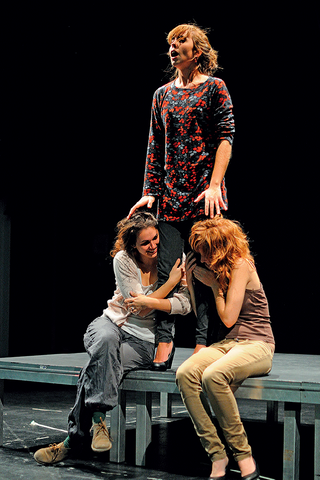
Drama exploration: crime and punishment
£14.95
The first unit of the Edexcel Drama GCSE is Unit 1 – Drama Exploration. This unit is based around a theme, providing students with a variety of stimulus material in order for them to create drama individually and within a group. The theme you choose for this unit is important, as it must be explored over the six-hour workshop and needs to keep your students interested, but it must also have good dramatic potential and help them to demonstrate variety and flair in both rehearsal and performance.
As the documentary response for this unit is double the length of Unit 2, I teach Unit 1 in Year 10 and leave this Unit 2 to the beginning of Year 11. I think that my students have a more confident understanding of the process, have developed as actors and are able to respond to stimuli in a more interesting way and feel more assured when it comes to writing a 2,000 word documentary response. This is just one way of doing it, but of course you would choose to deliver the units in the way that suits your own students.
This scheme is based around the theme of Crime and Punishment. In order for students to be inspired by the theme to create interesting and imaginative pieces of drama it covers a range of stimuli. Edexcel requires you to use two stimuli, but there are many more within this scheme and many others that I will go on to suggest, should you wish to add to, alter or pick and choose which ones to use in order to suit your students best. When introducing your students to any new topic, you want to ignite their imaginations in order to draw out of them their best work. The topic needs to be weighty enough to engage students from the full ability range. The less able candidates will be able to access the topic easily, but the stimulus material that is chosen here should also stretch your top students to achieve the highest marks, as the stimuli are diverse and are open for interpretation both in terms of understanding and in performance potential.
I recently attended an Edexcel course about how to push your top students to access the highest marks and the thing that I felt was most important from the day was that when you ask students to complete tasks they must be layered. Everyone starts with the basics of the task, and then you layer on different elements in order to stretch your most able candidates to demonstrate what they are able to do.
How you choose to film the six-hour assessment is up to you, depending on your timetable and the availability of the space that you teach in. I teach this in six blocks of one hour. This gives time for breathing space in between filming sessions to catch up on notes, and I think it helps to keep them fully engaged for each hour, as an entire six-hour filmed day may get too much. This decision however, is very much up to what will suit you and your students and whether you are able to be flexible with your timetable.
The scheme covers the required content for choice of stimuli. They must cover at least two stimuli in order to explore the scheme. In this scheme of work students will respond to a poem, an artefact, a piece of music a play and a film. You do not have to cover this many stimuli, but in order to get the best work from students I try to use as many ways to stimulate them into creating interesting, imaginative and exciting pieces of work as possible.
At least 4 explorative strategies will also be covered and at least two drama mediums.
Practical work (AO1) is marked in the filmed assessment sessions and is out of 40. This is internally marked and externally moderated. The accompanying documentary response AO3) is worth 20 marks and must be 2,000 words in length. Don’t forget to remind your students that once the camera is on, they need to demonstrate their use of drama vocabulary, their ability to push work forwards in a group, respond to discussion and make evaluative comment. If this is not in evidence on film, you cannot award them the marks.
Before the scheme starts asks your students to complete a small research task in order to help them with the first filmed session:
- What is a chain gang?
- Explore how people were treated in 1920’s penitentiaries in the United States of America.
- What rights did people have at this time in history?
- What was the justice system like at this point in time?
Learning objectives
- Through a six hour workshop, students will learn to use their knowledge of explorative strategies, drama mediums and elements to explore a theme, using stimulus material provided. They will be internally assessed during this practical workshop.
- Students will learn to evaluate the effectiveness of their own work and the work of others.
- They will then be able to translate their oral comments into written notes for their documentary response.
The facts
- Internally teacher-assessed practical workshop under controlled conditions.
- Internally teacher-assessed documentary response (max 2,000 words).
- Both of these assessments are then externally moderated. The centre will provide a DVD of filmed classwork (1hr of the 6hrs of work) for moderation. The centre will also send a sample of students’ documentary response work for moderation when asked. The sample will be chosen by Edexcel.
Number of lessons: 6




